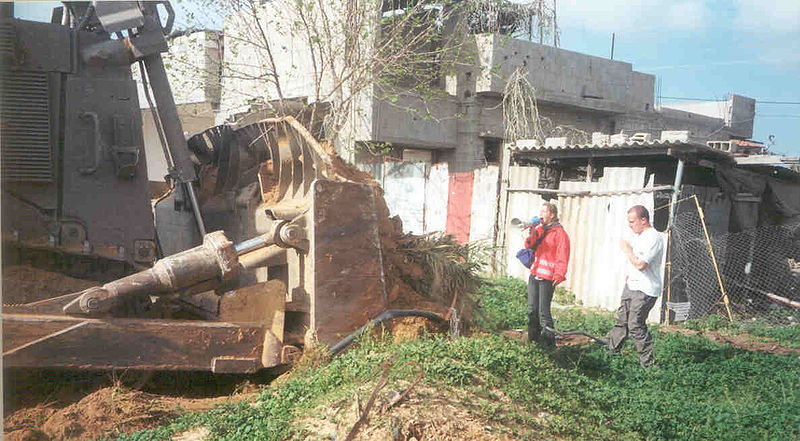No bulldozer can bury the truth: Remembering Rachel Corrie
April 9, 2023
In another echo of early 2003, the twentieth anniversary of the death of Rachel Corrie on 16 March went largely unreported.
As the worlds attention was concentrated on an imminent attack on Iraq in March 2003, it is not surprising that media did not dwell too long or deeply on one young womans death. Unfortunately, while in 2023 media did remember that disastrous war of two decades earlier, it repeated its neglect of the killing of Rachel Corrie.
Rachel Corrie was born on 10 April 1979 and was killed on 16 March 2003. Like so many young people, Rachel Corrie of Washington State in the USA, was driven by her ideals to undertake some public service overseas. Many students of college and university age are ambitious to work for an NGO and are careless of any impacts on their income and career prospects. In other words, they will make sacrifices in order to be able to feel that they are working ethically to relieve world poverty, stop oppression and create a more just world.
A committed pacifist, Rachel Corrie wanted to link her home town of Olympia with Rafa in the Gaza Strip. While in Palestine, she decided to take a first hand look at the conflict between Palestinians and the Israeli military. In particular she actively placed herself on the front line as armoured bulldozers were destroying homes in the Gaza Strip, allegedly because they were illegal. Palestinians said that the demolitions were an aggressive form of collective punishment and part of Israels war on Palestinians.
Corrie placed herself before a house targeted for demolition. She was a human shield, courageously confronting with her flesh and blood the might of the Israeli military. The government of Israel said that the bulldozer driver crushed Corrie accidentally, having failed to see her but Corries colleagues in the International Solidarity Movement claimed that the driver acted deliberately. If those claims are correct, then many other words could be used to describe the bulldozer action including ruthless, cruel and murderous.
Amnesty International and Human Rights Watch criticised the Israeli governments investigation of Corries death and the US ambassador described the inquiry as unsatisfactory. Corries parents attempted unsuccessfully to sue the government of Israel when other avenues failed.
It is appropriate that many artists found Corries bravery inspirational. On the Anti-War Songs website (antiwarsongs.org), Rachel Corrie has an itinerary of her own. There are 38 contributions in this category including those by Holly Gwin Graham, Jim Page, Alice Shields, Patti Smith, David Rovics and Billy Bragg. Alaska composer Philip Munger wrote a cantata called The Skies Are Weeping but following criticism that he was celebrating terrorism - and threatening emails he did not produce the work initially in the USA but in London.
Also in England, actor Alan Rickman and journalist Katharine Viner were so moved by Rachel Corries story that they collaborated on a play My Name is Rachel Corrie. Again, they had trouble staging the play in the USA and rejected criticisms that the work could be described as anti-Semitic. There is also a Peace Foundation named in Corries honour.
The USA has used its veto to block some 50 Security Council resolutions critical of Israel. Most were not radical proposals. Perhaps had the USA allowed these resolutions through, Israel might have moderated its behaviour over the Gaza Strip and been more careful in its use of the military against Palestinians.
Perhaps it is even possible that Rachel Corrie might still be alive - perhaps too might Al Jazeera reporter Shereen Abu Akleh who was shot by an Israeli soldier on 11 May 2022. The UN Special Rapporteur Francesca Albanese said that it was possible that the killing of Shereen Abu Akleh constituted a war crime and the Security Council issued a rare unanimous press release condemning the shooting. As Israel has refused to interrogate its soldiers about the incident, Al Jazeera continues to campaign for an investigation by the International Criminal Court.
Unfortunately, it is likely that even the mere mention of the names of these women will produce knee jerk cries of anti-Semitism from some quarters. For all fair minded people however, the stories of Rachel Corrie and Shereen Abu Akleh should never be forgotten. You cannot bulldoze the truth.
